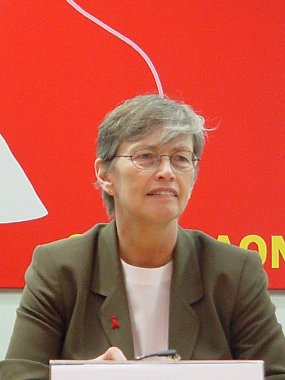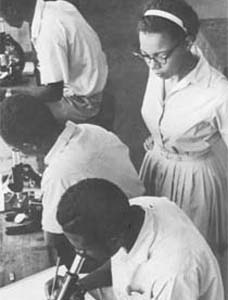
Carol Bellamy says: There'd been some pressure during that presidential election that whoever was elected to encourage them to appoint somebody who had been a volunteer. I'm not sure what big difference that made other than the new people coming in knew that I had been a volunteer many years before
Exec. Director of UNICEF Carol Bellamy Talk Asia Interview Transcript
By Stan Grant
CNN
April 11, 2005
Exec. Director of UNICEF Carol Bellamy TalkAsia Interview Transcript
Monday, April 11, 2005 Posted: 5:51 AM EDT (0951 GMT)
SG: Stan Grant
CB: Carol Bellamy
BLOCK A
SG: Hello I'm Stan Grant, welcome to this special edition of TalkAsia coming to you from Beijing. Now no one who experienced the tsunami could ever forget what they saw, whether it be on television or actually being there - the truly horrific images of suffering and destruction. Someone who was very much in the thick of it was Carol Bellamy, the head of UNICEF. She was there trying to help children make sense of it all. Of all the victims of the tsunami it's estimated that about a third were indeed children. Now Carol is our special guest this week on TalkAsia, she talks to us about ten years with UNICEF and her work with children all over the world. I began by asking her about the tsunami and her abiding memories of it.
CB: Big. The scale. I've seen some pretty terrible things in my life and some wonderful things, but I don't think I've ever seen anything of the scale of this, impact of this tsunami. I didn't visit all of the countries affected, but I did visit the Aceh area of Indonesia, I visited a number of the places in Sri Lanka, and also in Thailand. And it just goes on and on and on and to think so many people affected. A word I used often when I thought of Indonesia -- which was pulverized. I mean things just didn't exist anymore other than the mosque, which is still standing, but everything was just totally destroyed. And I mean just the amount of loss of life is almost beyond comprehension.
SG: So many of those affected by the tsunami were children. Not just children being victims, being killed in the tsunami, but those affected who'd lost their parents.
CB: We said early on that we thought that maybe a third of the victims, but we now believe it to be greater than a third. We base that really on the fact that all of these countries had relatively young populations, developing countries. But it's clear now that there really are more parents looking for children than children looking for parents. That because children are smaller they were more vulnerable, harmed more by the water, harmed by the debris in the water, less able to run, less able to hold on. The children particularly took the brunt.
SG: When we talk about so many children affected, it's not just the initial impact is it. You're talking about generations that have been lost -- the very future of a lot of these countries.
CB: You are...you know one of the interesting things about this disaster is that all of the countries affected, the governments actually started responding quite quickly. And in most instances the schools, even in the affected areas, began. Or if not the actual official school, schooling began again soon. But I traveled and visited some of the classes and in each of the classes the children could tell me how many of their friends had died or how many teachers they'd lost. Maybe not to the exact number but there was just a hole everywhere. So it does have long lasting impact.
SG: So many of the countries that were affected by the tsunami have been dealing with their own problems for a long time. War in countries like Sri Lanka and Acheh, in Indonesia. Was it difficult to try to manage a relief effort given these tensions?
CB: Well in both Sri Lanka and Indonesia these were conflict areas or part of the areas affected. It's made it more difficult. First of all in Indonesia, there was very little UN presence in the first place because of the conflict, and so our knowledge even though UNICEF and other UN agencies were in Indonesia, our knowledge of the area was less deep than it is in other parts of Indonesia. So that took awhile to even develop some relationships. It's working better now but it's been difficult. Sri Lanka, we'd long worked in the area where the Tamil Tigers existed and so we knew, we had partners; we could work with various groups. But still there's a tension. Now I must say to the credit of all the parties, they haven't put away the war, but there has been at least an uneasy peace if you will for awhile to try and respond to this crisis (SG: Some things are bigger than war I suppose. CB: Indeed. I mean everybody was so affected, they had to at least put some of this disagreement on hold).
SG: What about the response of the international community? Initially there was some criticism. Particularly criticism of some of the wealthier countries not giving enough - that has quickly changed. How do you assess the response of the international community?
CB: My time at UNICEF, in ten years, in twelve years in development, I have never seen an outpouring of generosity as I've seen in the tsunami. I think if there was any complaint in the beginning that was long overcome by the fact that this was the most extraordinary outpouring - not only of financial assistance but direct assistance. Whether it was health professionals, medical professionals, whether it was military, but military bringing the kind of equipment that was needed to try and reach people. It was really, I hope a breakthrough, in global solidarity. I don't want to sound too...too you know, carried away with this, I know it won't be able to be sustained at this level. But I hope to some degree that the fallout from this will be some additional solidarity globally for these kinds of crisis.
SG: You mentioned sustained effort. Is the effort going to be sustained once the focus is gone, once the television cameras have moved on?
CB: Well I wasn't talking only about sustained for the tsunami-hit countries. Frankly I think they are moving forward there has been significant financial resources made available. It will take a long time to rebuild but the countries are moving forward at this point. What I hoped is also some of the forgotten emergencies, if you want to use the word again, "forgotten" tsunami, or countries in crisis that seem to have fallen off the public attention. They will never come to the fore of the tsunami, but perhaps if there is at least a recognition of the level of crisis in other parts of the world that will not be entirely forgotten.
SG: Bob Geldorf, who we know has done a lot of work in Africa, has mentioned this problem. He has said, "Please don't' forget about the other tsunamis. Those other people who are affected and continue to be affected in other parts of the world". Are you seeing this? Are people managing to transfer the effort of the tsunami to other areas?
CB: We're seeing small signs of that. What I'm saying is I hope we'll see that. I think it's also interesting to point out that some of the poorest countries also made contributions. I remember noting that Mozambique, a very poor country but a country that's come out of war and is rebuilding, actually made a small financial contribution to the tsunami. If there was an understanding, a global understanding, that even if the poorest countries are prepared to step forward and say, "We can help a little bit". Then maybe some of the more wealthy countries are able to step forward and help those that have been forgotten.
SG: When we come back, we'll talk to Carol Bellamy about life before UNICEF. Stay with us.
Block B:
SG: Welcome back, Carole Bellamy has not always worked for UNICEF. She has for the past ten years, but before that she was once with the Peace Corps and even on Wall Street as a high flying lawyer and banker. I asked her about her varied life's work and that life's journey.
CB: I have had really a number of opportunities to both be in the public and the private sector. I'm a big believer in having some experience in both and urge young people when I have an opportunity to talk to them, to think about it. Don't get mired down in the same thing your whole life if you can avoid it. I mean become good at something, don't hop all over the place, but have some experiences. And I think in part you know for me a defining time of my life was when I was quite young and I was a Peace Corps volunteer in the United States. I was actually working in Guatemala, in Latin America, but it was two years of a challenge to myself to see if I could make a small difference in the communities I was in. And I was successful in some things and not in others, but it was a wonderful opportunity. And it said to me you know, "Try different things in your life and give it a go. See if you can make some success out of it"
SG: You mentioned the Peace Corps. And you're in fact the first volunteer who went back and then headed the organization.
CB: That's right. I mean you had to let several years go by because most of us were pretty young at that point. But there'd been some pressure during that presidential election that whoever was elected to encourage them to appoint somebody who had been a volunteer. I'm not sure what big difference that made other than the new people coming in knew that I had been a volunteer many years before. Some of them I think thought I was a volunteer in the dark ages. But it was again I think something that gave me the passion to run the Peace Corps, and recognizing that while I think the Peace Corps and other types of volunteer organizations like VSO out of the U.K. and other organizations. They can make a small difference in the countries in which they work, but the big difference is made on the volunteer. For me, the big difference was made on me. I think I made a small contribution as a Peace Corps volunteer but I took even more from it.
SG: It's so different isn't it though? Going from working in the Peace Corps, your work you're doing for UNICEF now and your years, the heady days, of working on Wall Street.
CB: Well after I left Peace Corps I went to law school and I thought I wanted to come back and work for the government but then I actually fell in love with things like corporation law and contract law -- I don't know where that came from. So I did go into Wall Street as a lawyer. What did I take? I think I took a dedication; I think I took a willingness to try different ways of achieving whatever I needed to achieve. At the same time I think you have to get up in the morning and look at yourself in the mirror and feel that what you're doing gives you some degree of satisfaction. So I've always tried to at least keep a little balance in my life even when I was doing finance and lawyering, which I like to do, I think one can be a very skilled person in this area. I still try to keep a little balance with doing some work in the non-profit area because I just like to do that.
SG: Similarly, what did you take from your years on Wall Street to your work in the Peace Corps and also at UNICEF?
CB: Well, again I hope I took a dedication to excellence in my work -- I think that's very important. A rigorous approach to your work, you don't have to be stuffy and boring but really quality is something that I think is very important. You don't have to be sloppy, quality is critically important. I think I learned a lot from my political years as well. I mean, politics is not just shaking hands and kissing babies, and I don't mean to put it in a less than serious way. I mean I was in politics in a time in New York City where we had to help get New York City out of virtual bankruptcy. It required very sophisticated budget balancing, budget cutting, setting of priorities. I think all of these contribute to whatever you do in life. You need to have priorities, you need to be careful, you need to go for quality, you need to have an ethical way of conducting yourself I think, and all of those contributed.
SG: Is it a lot more rigorous? Did you apply a lot more financial rigor to these organizations?
CB: I think so, I mean UNICEF was not in bad shape when I arrived but some of its systems were a bit outdated - particularly its financial and technology systems. We're in the UN so you know, we can't be General Motors, we can't have the five-star systems. But I did spend some time trying to strengthen the operating side of UNICEF. Nobody really cares that much but I've always been proud that we've had perfectly clean audits the entire time I've been at UNICEF. At the same time we've doubled the budget in the ten years and I think that is in part a vote of confidence from the donors, both the government and the private sector donors on UNICEF's work. It doesn't mean that we haven't had some hiccups -- we have. We've hit some bumps but I think it's a vote of confidence.
SG: You're watching TalkAsia coming to you from Beijing. When we come back we'll talk to Carol Bellamy about her work with human rights and children affected by conflict.
Block C:
SG: Welcome back, Carol Bellamy has made a feature of her work with UNICEF the focus on human rights and children affected by conflict. More and more children are not just the victims but the actual targets of war. And then they're AIDS, the single biggest according to Carol Bellamy, facing children. I asked her about some of these challenges.
CB: We don't live in a perfect world and the challenges for children still remain. I mean there's still close to ten million children who die every year in this world from totally preventable causes. I mean we're not talking about breakthroughs that you need, these are preventable causes. This is unacceptable. There are too many children caught in war today. I mean war is not a matter of military anymore. It's largely a matter of multiple parties fighting within a country and the victims of war are not any more military. They are largely civilian -- women and children.
SG: Carol so often we see children not just the victims of conflict but actually targeted by conflict don't we?
CB: Well the targets and sometimes...they are the victims sometimes but they are the victimizers sometimes as well. The use of children as soldiers, the use of girls for sex purposes in the course of war, the terrible use of gender violence in war today is really appalling. And children and young people are too often both the victims and the victimizers and this is again unacceptable in a society in the 21st century.
SG: AIDS. Let's talk about that now of course the biggest problem facing children.
CB: The most highly infected percentages of populations exist in Africa. But if you take just raw numbers, perhaps as many people in places like India and China are infected, it's just a smaller percentage of the population. The Caribbean, places like Russia, Ukraine, where there was almost doubling. So HIV and AIDS continues to grow, it is not declining, the impact on children is extraordinary. As you point out 15 million AIDS orphans already. But that's just one picture of this pandemic. It deserves global attention probably more than any other problem.
SG: Again, you say so many of these problems are easily fixed. And when you're looking at AIDS the drugs are available aren't they? What is it going to take to get these anti-retroviral drugs cheaply to those people who most need them?
CB: Well a difference can be made and it's starting to be made. I mean if you look today at the amount of financial resources fighting HIV/AIDS. Far more than just two or three years ago -- that's good. There are programs now to provide more treatment -- that's good. Although, largely for adults, still much too little in the area of pediatric AIDS. Much greater attention needs to be paid there. If one realizes again HIV and AIDS is not something that passes through the air, it requires an act. If you change that behavior and act differently, something can happen. So until there is a cure for AIDS, and one would hope that that would happen at some point, the best cure still is education. And the barriers of silence for the most part in the world have now been cracked. They are not entirely down but they have at least been cracked. And I think more can be done but the attention of the entire world has to be put to AIDS. It can't just be left to individual country after country.
SG: You mentioned pediatric care, the pediatric treatment of children suffering AIDS. How does it differ from the treatment of adults and why is not enough being done?
CB: Well, there's not enough pressure there. The fact is the treatment for adults, because there's more demand in the developed countries, that's also having an impact on the prices coming down in developing countries. There is less impact and less pressure for pediatric AIDS treatment at this point, and therefore things are going on like cutting the pills in half to have a smaller amount rather than more attention. It's something that we at UNICEF probably should have spent more attention on and we will be doing that in the future, but it does require more arm-twisting to try and get the costs down.
SG: Now you're visiting China, your last visit as head of UNICEF. Is China doing enough to deal with the problem of AIDS or is it still something they prefer to keep out of sight and out of mind?
CB: Certainly what the government has done in terms of better regulation of blood is one step, dealing with drug use is going to have to be another step, but understanding it's not just going to be limited to these particular communities. So, more needs to be done when it comes to HIV and AIDS in China, but a dramatic change just in the last couple of years for the good in terms of China's approach to confronting HIV and AIDS.
SG: Now another problem in China and also in Asia is the trafficking of children either sexual exploitation or slave labor. How do you get governments in this region to work together on this problem?
CB: Well trafficking is an area where governments do need to work together and different parts of governments. It's not only the interior ministry which is the police but also the social services. Again it's a matter of...a number of things. It's a matter of children being counted in the first place, making sure in countries that there's birth registration so the children are not...they don't disappear from the statistics. That may not sound like it helps a lot, but if you exist in the eyes of the government that's at least a start. Making sure children do go to school. Again, the best antidote to these exploitation issues is schooling and making sure children go to school. Recognizing the fact that trafficking exists: for sex purposes, for labor purposes, sometimes for families who want a little boy child. I mean it's for many different purposes. Working with local communities, here in China again we've worked with the old China Women's Federation for example, as well as with the Ministry of the Interior. This was something new for UNICEF. Historically we haven't necessarily worked with the judiciary or police in the past. But when it comes to exploitation it's important to do that.
SG: When you look at your years in UNICEF we've talked about some of the problems and the challenges and the work still to be done, but what are the great successes?
CB: Well, I feel I'm leaving a UNICEF that is strong, that is flourishing, that is really a voice and a conscience for children globally. And so issues such as HIV and AIDS and children in conflict and child exploitation will not be pushed under the rug and will be challenged. I think I leave a good agenda and priorities that will continue to be pursued. And yet at the same time there is still work to be done and so I don't leave thinking, well boy everything is taken care of. Because this is a world that still doesn't fully respect the rights of children. And when it does it's a world that will fully respect itself.
SG: Now you talk about work to be done and there still of course a lot of work to be done still for Carol Bellamy. And you're not going to be leaving the field of working with children are you; you're going to be working in education?
CB: I am. I'm going to join an organization, I'm going to head a small organization called World Learning that's involved in international education, global exchange programs. Having gotten the experience myself as a young person seeing some more of the world, and I don't mean just traveling, but understanding a little bit more. I truly believe that if particularly young people had a bit more understanding of each other, a little more tolerance in the world, we could see some of the tensions that unfortunately exist much too much in the world today be reduced. So I'm glad I'm still going to be making my small contribution to that.
SG: Pleasure to speak to you, thank you very much.
Thank you for watching TalkAsia and our special gust this week, Carol Bellamy, the head of UNICEF. I'm Stan Grant, in Beijing.










